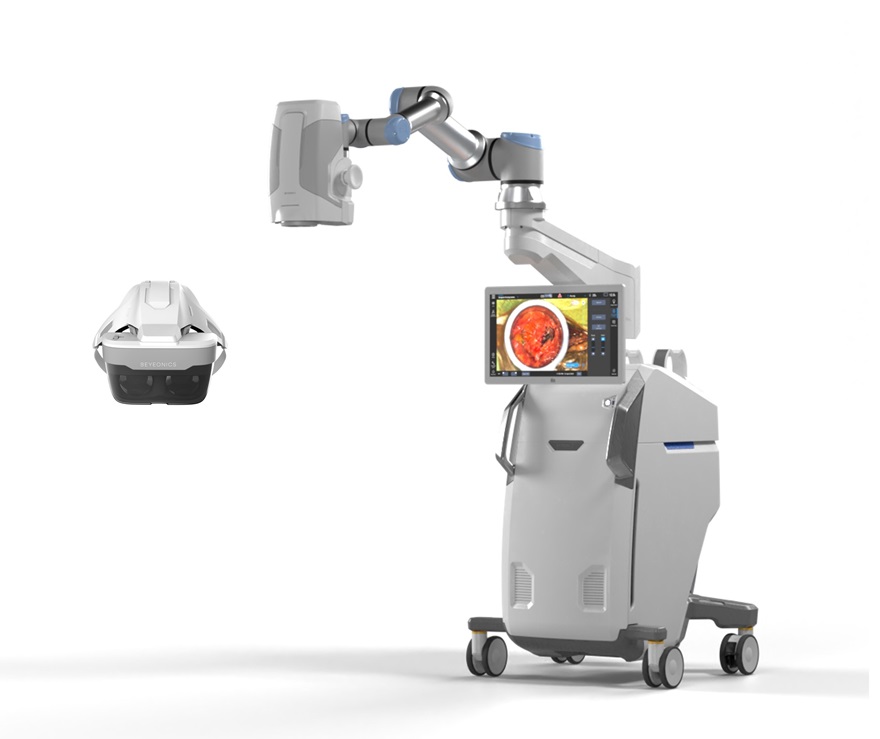World’s Smallest Heart Pump Maintains Blood Pressure and Flow During Stent Placement
|
By HospiMedica International staff writers Posted on 18 Aug 2022 |
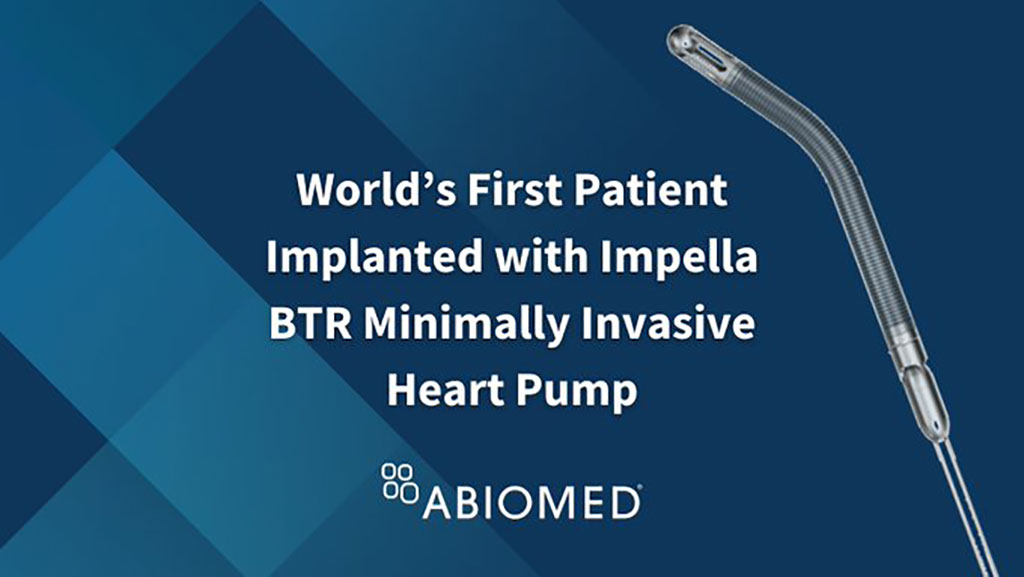
Patients with coronary artery disease may undergo a procedure called Percutaneous Coronary Intervention (PCI), commonly known as angioplasty or stenting. This minimally invasive heart procedure uses a small catheter to take pictures and deliver tools that are used to open or unblock arteries narrowed by plaque. The most common type of PCI is angioplasty, during which a tiny balloon is inflated to compress the plaque against the sides of the artery to help blood flow better. During a PCI, interruptions of coronary blood flow can cause problems, especially for patients with severe heart disease. As a result, patients with health risks such as diabetes, kidney disease, or anatomic issues with the heart may not be qualified for a conventional PCI. Now, a new stenting procedure may be an option for some patients with these additional health risks.
The new stenting procedure known as Protected PCI is designed to treat complex coronary artery disease and includes the use of the Impella heart pump from Abiomed, Inc. (Danvers, MA, USA). The use of an Impella heart pump during a PCI allows blood pressure and blood flow to be maintained during the procedure, which may allow surgeons to perform a more complete and optimized procedure. Impella is temporarily inserted through a small incision and advanced through the arteries and into the heart. Once in place, the Impella heart pump is turned on, pulling blood from the left ventricle and releasing it into the aorta. This active ‘unloading’ of the left ventricle increases blood flow to the brain and other vital organs and protects the kidneys from acute injury. When the heart is strong enough to pump on its own and the Impella heart pump is no longer needed, the cardiologist removes it before discharging the patient from the hospital.
Impella, the world’s smallest heart pump, is the only FDA-approved, non-surgical heart pump proven safe and effective to assist the pumping function of the heart during stent placement and ensure blood flow is maintained to critical organs. During a Protected PCI, or protected stenting procedure, the Impella heart pump is placed temporarily in the heart to assist the pumping function while the physician performs the necessary treatment (angioplasty, stent placement, etc.). Impella features SmartAssist technology that gives medical providers insights to help them improve patient outcomes through intelligent metrics. Impella, the world’s smallest heart pumps, are intended for temporary (less than or equal to six hours) use to maintain stable heart function.
Abiomed is now developing Impella Bridge-to-Recovery (BTR), a forward flow heart pump that is implanted via the axillary artery and sits in the left ventricle, can pump greater than six liters of blood per minute. It is smaller and less invasive than current LVADs and allows patients with chronic heart failure to have a longer-term minimally invasive heart pump option. Impella BTR’s design is intended to allow for heart recovery or heart remodeling with adjunctive therapies for patients with class III / IV heart failure. The vision of the Impella BTR development program is to provide a patient with home discharge and more than one year of full hemodynamic support. The first patient in the world has been successfully implanted with Impella BTR as part of the heart pump’s U.S. Food and Drug Administration (FDA) Early Feasibility Study (EFS).
“The first implant of Impella BTR is an important step toward our goal of improving patient care by providing a longer-term minimally invasive forward flow smart heart pump option with home discharge for patients with chronic heart failure,” said Michael Minogue, Abiomed’s Chairman, President and Chief Executive Officer. “Overall, Abiomed is creating the innovation for the field of heart recovery and solving a healthcare crisis for this patient population with advanced research and technology.”
Related Links:
Abiomed, Inc.
Latest Surgical Techniques News
- Study Warns Against Dangerous Smoke Levels Produced During Endoscopic Gastrointestinal Procedures
- New Hydrogel Sealant Effective at Sealing Dural Defects and Preventing Postoperative Adhesion
- MRI-Guided Multi-Stage Robotic Positioner Enhances Stereotactic Neurosurgery Precision

- AR Visualization System Improves Surgeons’ Capabilities and Spatial Awareness
- New Adhesive Hydrogel Coatings to Prolong Lifespan of Pacemakers and Medical Implants
- Maneuvering System Empowers Surgeons with Enhanced Control during Laparoscopic Procedures
- New Two-Dimensional Material Paves Way for Safer, More Effective Implantable Medical Devices
- Portable MRI Compatible Surgical Robot Improves Patients Outcomes for Neurosurgery
- World-First Device to Remove Bacterial Biofilm Inside Endoscopes
- Minimally Invasive Imaging Technique to Revolutionize Ureteral Injury Detection
- Modular Communicative Leadless ICD Proves Safe and Exceeds Performance Expectations
- AR Surgical Technology Translates Complex 2D Medical Imaging to Enhance Accuracy
- Miniaturized Snake-Like Probe Images Cerebral Arteries From Within
- Miniaturized Implantable Multi-Sensors Device to Monitor Vessels Health
- Tiny Robots Made Out Of Carbon Could Conduct Colonoscopy, Pelvic Exam or Blood Test
- Miniaturized Ultrasonic Scalpel Enables Faster and Safer Robotic-Assisted Surgery
Channels
Artificial Intelligence
view channel
AI-Powered Algorithm to Revolutionize Detection of Atrial Fibrillation
Atrial fibrillation (AFib), a condition characterized by an irregular and often rapid heart rate, is linked to increased risks of stroke and heart failure. This is because the irregular heartbeat in AFib... Read more
AI Diagnostic Tool Accurately Detects Valvular Disorders Often Missed by Doctors
Doctors generally use stethoscopes to listen for the characteristic lub-dub sounds made by heart valves opening and closing. They also listen for less prominent sounds that indicate problems with these valves.... Read moreSurgical Techniques
view channel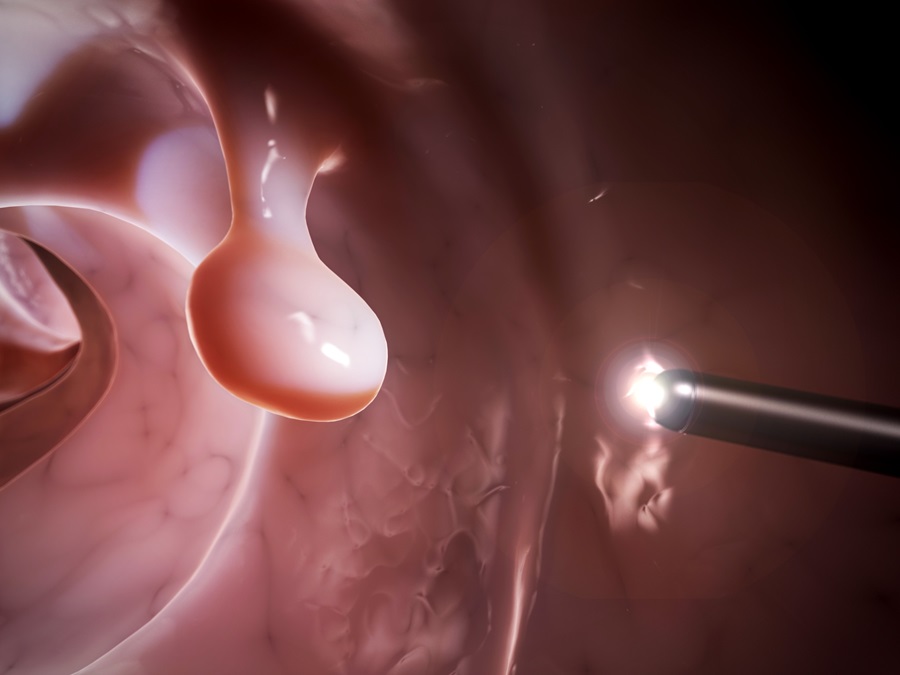
Study Warns Against Dangerous Smoke Levels Produced During Endoscopic Gastrointestinal Procedures
Healthcare professionals involved in certain smoke-generating endoscopic gastrointestinal procedures, such as those using electrical current to excise polyps, may be exposed to toxin levels comparable... Read more
New Hydrogel Sealant Effective at Sealing Dural Defects and Preventing Postoperative Adhesion
The dura mater is a fibrous membrane of connective tissue that envelops the brain and spinal cord. In neurosurgical procedures that require access to the brain or spinal cord, opening the dura mater often... Read more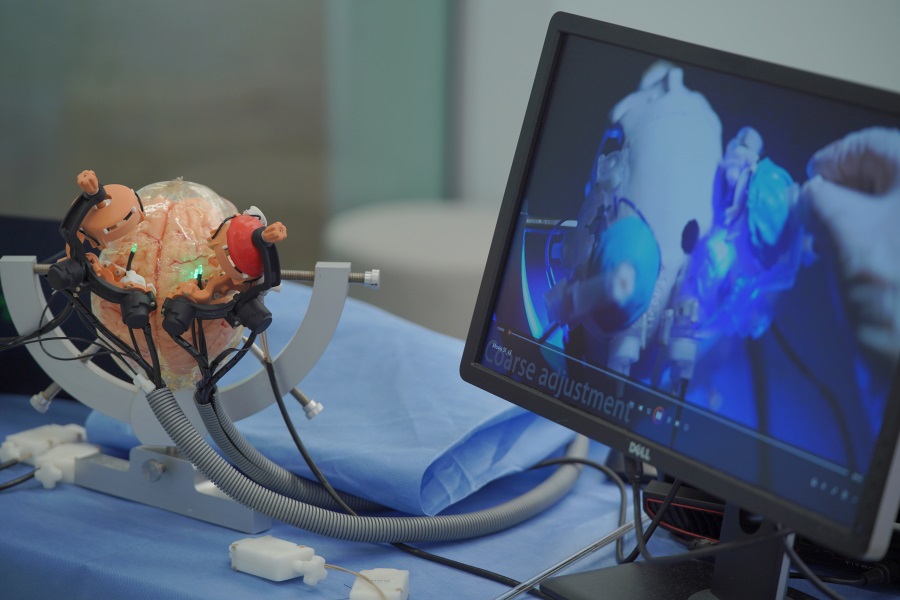
MRI-Guided Multi-Stage Robotic Positioner Enhances Stereotactic Neurosurgery Precision
Magnetic resonance imaging (MRI) offers significant benefits in neurosurgery, providing detailed 3D visualizations of neurovascular structures and tumors. Traditionally, its use has been restricted to... Read morePatient Care
view channelFirst-Of-Its-Kind Portable Germicidal Light Technology Disinfects High-Touch Clinical Surfaces in Seconds
Reducing healthcare-acquired infections (HAIs) remains a pressing issue within global healthcare systems. In the United States alone, 1.7 million patients contract HAIs annually, leading to approximately... Read more
Surgical Capacity Optimization Solution Helps Hospitals Boost OR Utilization
An innovative solution has the capability to transform surgical capacity utilization by targeting the root cause of surgical block time inefficiencies. Fujitsu Limited’s (Tokyo, Japan) Surgical Capacity... Read more
Game-Changing Innovation in Surgical Instrument Sterilization Significantly Improves OR Throughput
A groundbreaking innovation enables hospitals to significantly improve instrument processing time and throughput in operating rooms (ORs) and sterile processing departments. Turbett Surgical, Inc.... Read moreHealth IT
view channel
Machine Learning Model Improves Mortality Risk Prediction for Cardiac Surgery Patients
Machine learning algorithms have been deployed to create predictive models in various medical fields, with some demonstrating improved outcomes compared to their standard-of-care counterparts.... Read more
Strategic Collaboration to Develop and Integrate Generative AI into Healthcare
Top industry experts have underscored the immediate requirement for healthcare systems and hospitals to respond to severe cost and margin pressures. Close to half of U.S. hospitals ended 2022 in the red... Read more
AI-Enabled Operating Rooms Solution Helps Hospitals Maximize Utilization and Unlock Capacity
For healthcare organizations, optimizing operating room (OR) utilization during prime time hours is a complex challenge. Surgeons and clinics face difficulties in finding available slots for booking cases,... Read more
AI Predicts Pancreatic Cancer Three Years before Diagnosis from Patients’ Medical Records
Screening for common cancers like breast, cervix, and prostate cancer relies on relatively simple and highly effective techniques, such as mammograms, Pap smears, and blood tests. These methods have revolutionized... Read morePoint of Care
view channel
POCT for Infectious Diseases Delivers Laboratory Equivalent Pathology Results
On-site pathology tests for infectious diseases in rural and remote locations can achieve the same level of reliability and accuracy as those conducted in hospital laboratories, a recent study suggests.... Read more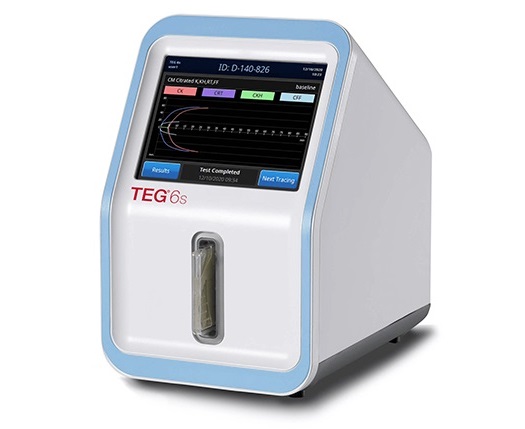
Cartridge-Based Hemostasis Analyzer System Enables Faster Coagulation Testing
Quickly assessing a patient's total hemostasis status can be critical to influencing clinical outcomes and using blood products. Haemonetics Corporation (Boston, MA, USA) has now obtained 510(k) clearance... Read more
Critical Bleeding Management System to Help Hospitals Further Standardize Viscoelastic Testing
Surgical procedures are often accompanied by significant blood loss and the subsequent high likelihood of the need for allogeneic blood transfusions. These transfusions, while critical, are linked to various... Read moreBusiness
view channel
MEDICA INNOVATION FORUM for the Healthcare Innovations of the Future
By always offering innovations and updating existing program formats, the internationally leading medical trade fair MEDICA in Düsseldorf has been successful for over half a century and always gives its... Read more












